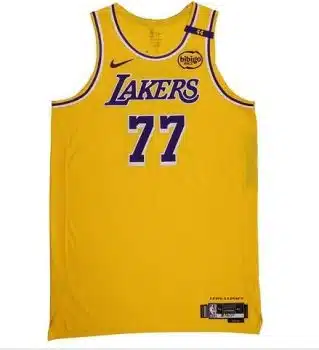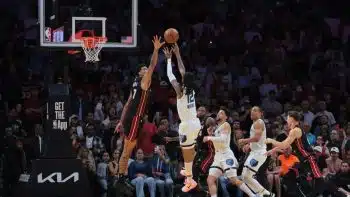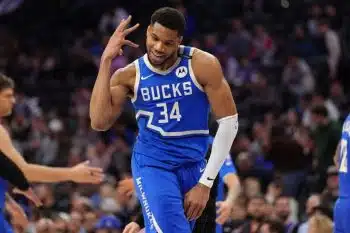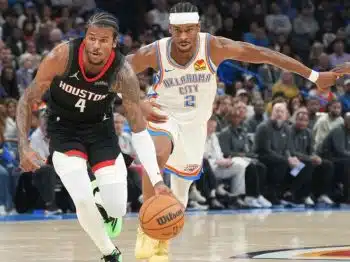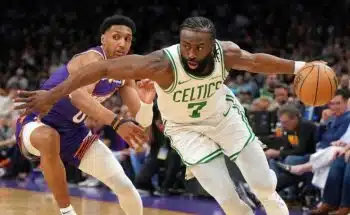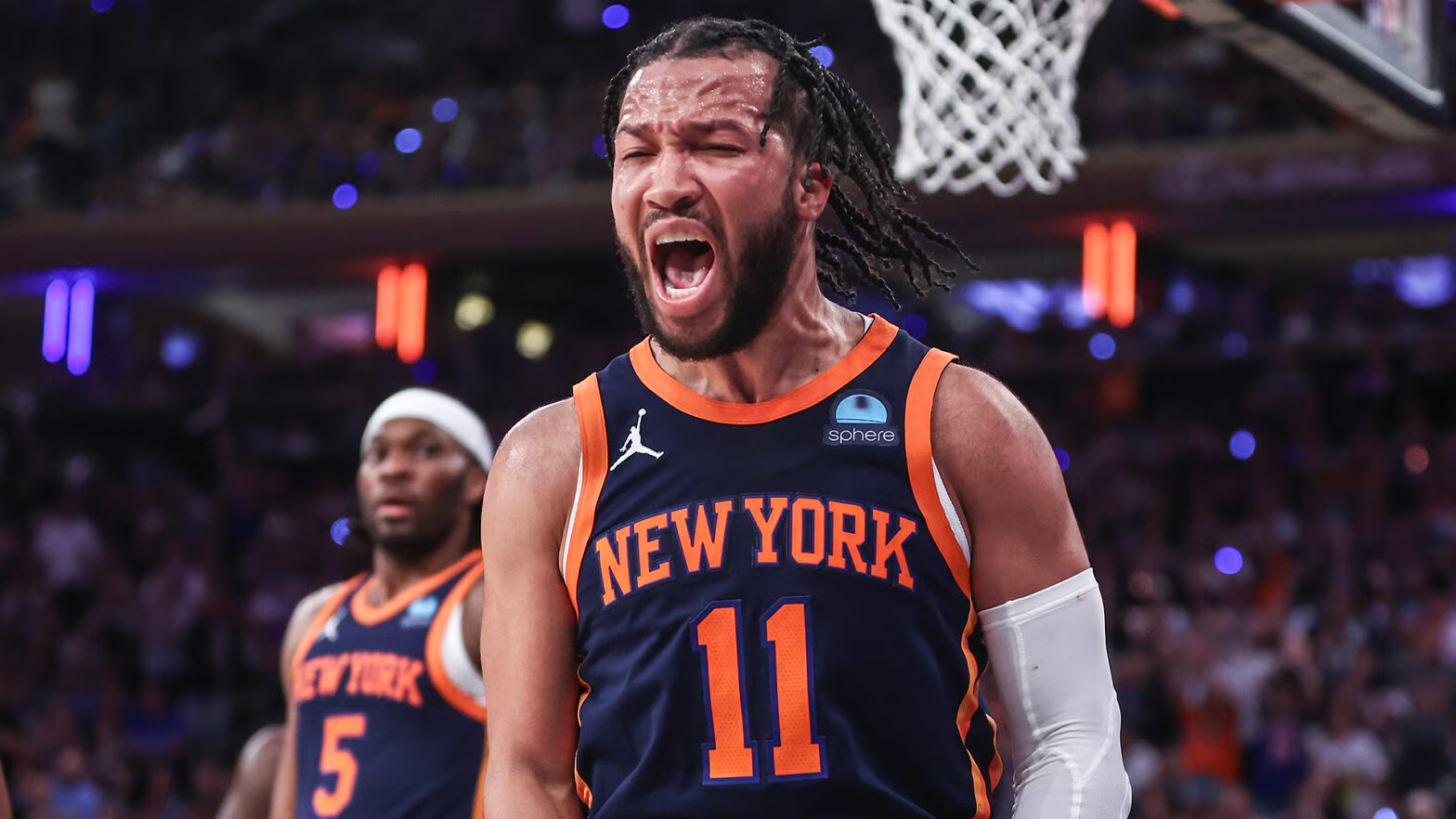NBA
NBA Daily: Why Boston Rebuffed Indiana
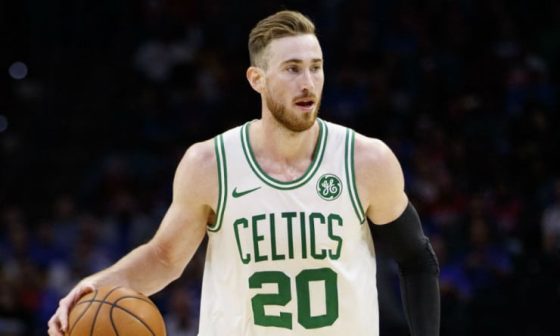
Let’s be clear on this: There is some valid intrigue to one Myles Turner.
He is one of the rare hybrid bigs who can block shots (at a high clip) and shoot threes (at an average clip) – and all in a league that values that sort of skillset in bigs now more than ever. He’s a seven-foot rim-runner that jumps like his legs are made out of pogo sticks with arms long enough to make Mr. Fantastic jealous.
Although he hasn’t grown much as a player over the last three years, you can make the case that none of that is on him. The Indiana Pacers outgrew him for reasons out of his control, which, in turn, has limited his effectiveness and made him a little underrated.
And best of all, had the Celtics acquired him for Gordon Hayward, Turner would have strengthened their frontcourt on depth alone. Their frontcourt weaknesses definitely showed itself in the postseason when it mattered the most. Turner was attainable, is a better fit in Boston than he currently is in Indiana and he fits with Jayson Tatum and Jaylen Brown’s timeline, so why didn’t the Celtics agree to take him from Indiana when they had the chance?
At first glance, the simple answer is that they just didn’t want him that badly. More and more details have come out saying that the Celtics gauged trade interest around the league for Turner and didn’t really get anywhere, so they wanted more from Indiana.
Not too long after the Hayward debacle, it was announced that the Celtics were bringing in Tristan Thompson – a starting-caliber big who rebounds better, costs half as much as Turner and has championship experience – further reinforcing that Boston just wasn’t that into the center.
That sadly doesn’t really answer the question, since, all things considered, getting someone like Turner surely would have been a better alternative than letting Hayward walk for nothing. Even if the Celtics didn’t have much interest in Turner to begin with, why this route?
Well, maybe it wasn’t about the prospect of getting Myles Turner. Maybe it was more about what kind of asset they were letting go of. Maybe, just maybe, Boston didn’t want to make an Eastern Conference rival potentially stronger than them.
If everything went Boston’s way, Gordon Hayward would still be suiting up for the Celtics. They were willing to pay Hayward upwards of nine figures to keep him as the fourth guy in their pecking order. Evidently, Hayward didn’t want that, and it’s not hard to see why.
Besides getting a bag so expensive that pretty much everyone unanimously agrees that it was a gross overpay, Hayward’s injuries combined with the unexpectedly rapid growth spurts of Tatum and Brown greatly diminished his role in Boston since first joining back in 2017. Remember that when Gordon Hayward signed a max contract with the Celtics, nobody second-guessed it from either side because he was supposed to be a featured player on a team aiming for a title. Subsequently, that went *poof* just six minutes into his first season in Boston.
You know the rest.
Fast forward to the end of this season and it was clear that Hayward wasn’t a featured player anymore and just part of the supporting cast. Being the fourth option has its perks, like not having the pressure to be the guy night-in and night-out. Especially when you’re being paid $30 million to do it. Alas, no player signs a max contract intending to be a complementary piece on a contender. Hayward wanted a bigger role and that wasn’t happening in Boston.
He’s going to get just that in Charlotte, probably would have gotten that in Indiana, and Myles Turner, Doug McDermott and a first-rounder isn’t the worst return for someone who was leaving anyway.
But know why the Gordon Hayward era in Boston turned out to be a dud? Hayward never quite figured out what he was supposed to be on the team. He was the most overqualified fourth option in the league and, yet, never quite ran with that role. Hayward brought more good than bad, but the inconsistency was maddening.
There were moments where the Celtics saw the Hayward of old, but they were flashes in a pan. Upon further inspection, there was a pattern. Almost every time Hayward put on a retro performance, someone else on the team happened to not be playing.
The first one of these performances came during the comedy of errors that was Boston’s 2018-19 season. His first season post-leg injury, Hayward wasn’t exactly the bucket-getter he was during his Utah days. He managed to eclipse the 20-point mark only seven times in the 81 games he played for the Celtics that season – and that included the postseason. So, whenever he had it going, it was safe to say that it was a rare occasion. Such an occasion happened on Jan. 2, 2019.

Hayward’s 35 points off the bench helped the Celtics rout the Minnesota Timberwolves, 115-102. This wasn’t Hayward’s first 30-point performance of the season. Hell, it wasn’t even his first 30-point performance against the Timberwolves that season. What made this even more surreal was that Hayward managed to do this without mercurial star Kyrie Irving. Well, it wasn’t like Minnesota was exactly the team to beat so there wasn’t too much to take from it. But then, on Feb. 12, it happened again.
Gordon Hayward put up yet another excellent performance – and this time against the twice revamped and very legitimate Philadelphia 76ers with Tobias Harris and Jimmy Butler. Yet again, no Kyrie, no problem. The Celtics won 112-109 going away, and they wouldn’t have done it without Hayward.

Any Celtics fan would tell you that it was a Kyrie thing seeing how badly that relationship ended. In fact, he had his best performance as a Celtic against the Cleveland Cavaliers on Nov. 5, 2019, where he hung a career-high 39 points on them.

This time though, there was no Jaylen Brown. Huh. So maybe it didn’t have much to do with Kyrie. Maybe Hayward played better when more touches were available. Hayward never put up a performance quite as strong as that one again – but anytime he had a standout performance, it usually fell under the exact same conditions. If Hayward had a great game it was because a vital player on the Celtics had been absent, and he was good enough to make up the difference.
For instance, on Jan. 28, Boston faced off against their future conference finals opponent Miami HEAT without the blossoming Jayson Tatum – moreover, it was in South Beach, where the home team had lost on their home floor only twice beforehand. Boston prevailed 109-101. How did they do it?

A month later, it happened again. This time against old friend Minnesota and this time without Kemba Walker. It didn’t matter then either. Hayward looked like himself.

Sure, Hayward had some fantastic games when the squad was at full strength and had some not-so-fantastic games when featured players were out, but this didn’t feel like a string of coincidences. At that time, it didn’t seem as evident, but in light of his departure, it stands out more now: The bigger role Gordon Hayward had in the offense, the likelier he was to perform better.
That was the conundrum with sending him to Indiana. Should he have been sent to the Pacers, there would have been more touches for him. Indiana already has some impressive offensive talent between All-Star center Domantas Sabonis and bubble-darling TJ Warren. Even with how good those two have been, theoretically, they wouldn’t have demanded the ball enough to limit Hayward’s role on the team like Boston inadvertently did with the Jays and Kemba.
With the ball in his hands more, the Hayward that showed up oh-so-sporadically in Boston may have been a mainstay in Indiana. That’s not a sure thing, but Ainge may not have wanted to take that chance.
It’s also worth mentioning that with the emergence of Sabonis, Indiana had less and less use for Turner. They’ve tried to make the pair work for the last three years. Their two-man net rating together is plus-2.1, which is fine, but it doesn’t show much progress compared to the plus-2.8 the year prior. With Sabonis’ emergence as their center of the future, it seems much more apparent that Turner is the odd man out.
So if the Celtics agreed to sign and trade Hayward for Turner among others, they’d be doing the Pacers potentially two favors:
1. Giving Indiana the better player and fit who would thrive in a bigger role.
2. Ridding Indiana of an already expendable player, talent and all.
Let’s now point out the obvious. Of course Danny Ainge didn’t want to lose Hayward for nothing. No one in his shoes would. But evidently, he didn’t think acquiring Turner as the centerpiece was worth possibly making the Pacers, an Eastern Conference rival, not only better with Hayward, but potentially better than the Celtics too.
Indiana was a mere 3.5 games behind Boston for the third seed in the Eastern Conference playoff picture. Hayward, even with his injury history, could have conceivably raised their ceiling high enough to supplant Boston. If Boston believed he wasn’t capable of that, then maybe they would have pulled the trigger on this deal – or more definitively, wouldn’t have been offering him $100+ million to keep him around.
Here’s a better way of putting it: The Celtics are much more likely to fear a team with Gordon Hayward if his supporting cast has the likes of Sabonis, Warren and Malcolm Brogdon than they are if his supporting cast has the likes of LaMelo Ball, Devonte’ Graham and PJ Washington.
Optimistically, Hayward makes Charlotte a borderline playoff team. There’s no telling what he could have done for Indiana if all they had to give up was Turner, McDermott and a first-rounder.
Ultimately, too, Hayward was moved by Charlotte’s out-of-the-park mega-offer – and that’s why he’ll be donning a Hornets uniform next season.
In the end, Boston did get something out of Hayward. A league-record $28.5 million trade exception. One so big that it took forking over two second-round picks to get Charlotte to comply. It’s hard to believe that Boston won’t use an exception that large – look at what Golden State just did with the exception they got for Andre Iguodala – just like it’s hard to believe that they’ll get someone of Hayward’s caliber on the trade market. A star is probably out of the question, but a young player with upside definitely isn’t. Someone like Myles Turner comes to mind. As stated earlier, there’s definitely some intrigue to Turner.
Just not enough intrigue to trade Gordon Hayward for – as Boston has made so abundantly clear.
